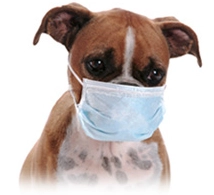Parvo Virus Outbreak in Grand Cayman
Parvo Virus Outbreak in Grand Cayman
An outbreak of canine parvovirus, a highly infectious disease that can be deadly for dogs, is spreading on Grand Cayman. This disease can be fatal to dogs but is especially dangerous for puppies aged six weeks to six months. Although there is no cure for the virus, vaccinating a dog or puppy against the parvo virus will protect them. Island Veterinary Service is appealing to all unvaccinated dog owners, regardless of age, to please get your dog vaccinated at your local vet.
Parvovirus infections will not sicken humans but can kill dogs. What's worse, the virus can survive for months or years in the environment and can be easily spread by humans with their hands and feet.
Parvovirus incubates for four to 14 days before symptoms like fever, anorexia, lethargy, dehydration, vomiting and diarrhoea emerge. Unvaccinated dogs should be kept out of public areas as they can pick up the virus from infected dogs faeces
Many dogs that are diagnosed with parvo will die. The virus attacks cells in a dog’s intestines and inhibits the absorption of vital nutrients. This means that a dog or puppy will become very weak and can die.
Young puppies and unvaccinated dogs, including those who have not had their booster injections, are most at risk from becoming victims of parvo. Puppies are at higher risk as their immune systems have to work very hard to fight the disease. Youngsters between six weeks and six months old are also more susceptible to secondary infections, or they may die from dehydration.
It is really important to protect your dog against this horrible disease by vaccinating them. Dogs and puppies can be vaccinated against parvovirus from the age of six weeks. Puppies should have their first vaccine at six weeks old. They then get a 2nd, 3rd and 4th 3weeks apart.
After this, a yearly annual booster vaccination is recommended. This is all that is needed to prevent your dog catching this, almost always, fatal disease.
What should I do if I suspect my dog has parvo?
If you recognise the symptoms above in your own dog, call your veterinary practice immediately for advice. Make sure to tell them what symptoms your dog or puppy has, and whether or not they’ve come into contact with a dog with confirmed parvovirus.
Most deaths from parvo happen within 48 to 72 hours after the symptoms begin. The quicker you seek help, the greater your pet’s chances of survival.
Keep your dog away from other dogs as it spreads easily. Tell your vet if you also have other dogs in your household as they can give advice on how to stop it spreading around all your pets.
Don’t forget that any cases of severe gastroenteritis should be taken seriously; even if parvovirus is not the cause, contact your vet if your dog has diarrhoea or any of the other symptoms.
For more information, please call Island Veterinary Services at 949.0787 or your local vet.
Latest News
-
Man Arrested Following Attempted RobberyPolice/Cou...12 December 2025, 02:00 PM
-
RCIPS Formally Announces the Commencement of Operation Winter GuardianPolice/Cou...12 December 2025, 01:59 PM
-
IMAC Elects 2026 Executive CommitteeBusiness12 December 2025, 01:57 PM
-
Cayman Delegation Participates in 61st CFATF Plenary in BarbadosGovernment12 December 2025, 01:56 PM
-
CIS opens applications for Caymanian Citizenship Scholarship Programme for 2026-2027.Education12 December 2025, 01:55 PM


